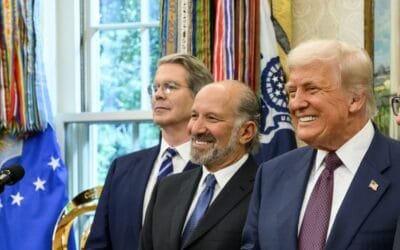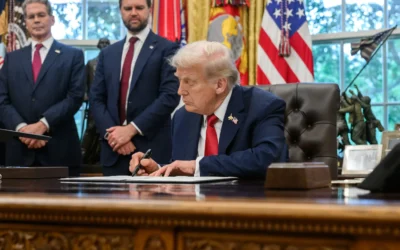Republican presidential candidate Donald Trump said he will push for companies, including Apple Inc., to bring manufacturing back to the United States.
“Make America great again,” Trump recently said in a speech at Liberty University in Virginia. “We’re going to get things coming. We’re gonna get Apple to start building their damn computers and things in this country instead of in other countries.”
Apple does research and design at its headquarters in Cupertino, Calif. but now manufactures most of its iPhones, iPads and Macintosh computers through partners in countries such as China. Apple made and assembled many products in the U.S. until the late 1990s, and then shifted manufacturing to Asia to take advantage of the region’s industrial base and lower labor costs.
Many will cheer Trump’s sentiments. America first!
But is “America first!” really the proper attitude? Or is “economic freedom first” the right way to go?
Donald Trump wants to make America great again. What made America so great in the first place? Economic freedom. Yes, capitalism. Not the phony capitalism of today, represented by Republican and Democratic officials making deals with profit-making companies in exchange for political pull or favors. Real capitalism—where all property is privately owned, all profit belongs to those who earn it, and where the government has no say whatsoever other than in cases of objective fraud or violations of contracts.
In an economically free country, a business may do business wherever, and with whomever, it pleases. The first and only obligation of a business is to its own interests—not to the nation where it resides.
Trump has a point, although I’m not convinced it’s the one he wants to make. The point? American businesses are hobbled by a myriad of regulations, taxes and a requirement for political pull, none of which would exist in a free market economy. We should lift all of those restrictions and taxes, as fully and quickly as possible, and allow America to become a free market economy. Businesses should still be free to hire workers in other countries, if it suits their needs, preferences and interests; everyone would benefit, including the consumers and employees in America who benefit from the resulting economic growth.
The main problem with Donald Trump is not his manner or style; it’s his protectionism. Protectionism is a form of collectivism or socialism. Its basic premise is that government can and must alter the marketplace to foster what the government considers its own interests.
Trump’s error stems from his lack of attention to ideology. He claims to love Ronald Reagan. Although an inconsistent pragmatist in practice, Reagan promoted the ideology of free markets and capitalism, often quite eloquently. Reagan would not agree with Trump’s protectionism; nor should anyone who favors laissez-faire capitalism.
I do not mean to imply that China is a free country. China is an avowedly fascist, state-controlled economy, more blatantly so than the United States. China has no respect for individual rights such as the right to free speech and to bear arms, neither nominally nor in practice. Whether it’s in the long-range interest of American companies to do business with or in China is a separate matter. But in principle, there’s nothing wrong with it just because China is not America.
Many people assume it’s automatically and always bad when a company hires workers in other countries to save money. But they never stop to think how this makes products and services cheaper than they otherwise would be. I’ll bet the people who applaud protectionism, which means forcing American companies to hire Americans rather than foreigners, do not wish to pay more for their iPhones. But it never occurs to them to make the connection. That’s what happens when you place emotions above reason, facts and logic. Sorry, Trump supporters. But it’s true.



